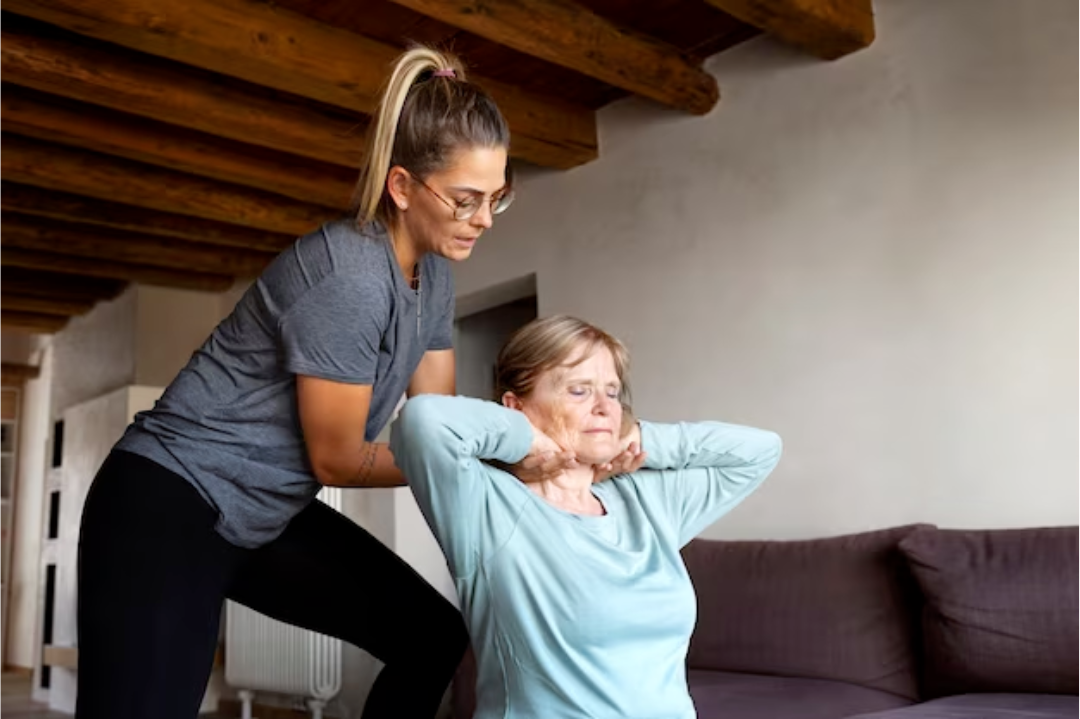Physiotherapy: Empowering Seniors with Strength and Balance

As we age, maintaining strength and balance becomes increasingly essential for overall well-being and independence. Fortunately, physiotherapy offers seniors a powerful tool for achieving and maintaining these vital physical attributes. In this article, we delve into the transformative benefits of physiotherapy for seniors and how it empowers them to lead a more fulfilling and active life. Physiotherapy, also known as physical therapy, focuses on restoring and enhancing physical function through targeted exercises and therapeutic techniques. For seniors, physiotherapy can address a wide range of age-related issues, including joint pain, muscle stiffness, and reduced mobility. By tailoring treatment plans to each individual’s specific needs, physiotherapists can help seniors improve their strength, balance, and coordination. These improvements not only reduce the risk of falls and injuries but also enhance overall quality of life. Furthermore, through regular physiotherapy sessions, seniors can regain confidence in their abilities and gain a sense of control over their bodies. This newfound strength and balance empower them to participate in daily activities, hobbies, and social engagements with ease and joy. Discover how physiotherapy can unleash the power within seniors, enabling them to live life to the fullest. The Importance of Physiotherapy for Seniors Physiotherapy plays a crucial role in maintaining and improving seniors’ physical well-being. It offers a holistic approach to senior care by addressing the underlying causes of physical limitations and providing personalized treatment plans. By working with a physiotherapist, seniors can regain control over their bodies and achieve newfound strength and balance. Physiotherapy is not just about treating existing conditions; it also focuses on preventive measures. Through regular physiotherapy sessions, seniors and elderly can proactively strengthen their muscles, improve flexibility, and enhance balance, reducing the risk of future injuries and falls. This preventive approach empowers seniors to lead an active and independent lifestyle. Understanding the Role of Physiotherapy in Enhancing Strength and Balance With age, muscle mass naturally decreases, leading to reduced strength and stability. Additionally, factors such as joint stiffness and decreased flexibility can further contribute to balance issues. Physiotherapy addresses these concerns through a combination of targeted exercises, stretching routines, and balance training. By incorporating resistance training into a senior’s physiotherapy regimen, muscles can be strengthened and rebuilt, leading to improved overall strength and stability. Resistance exercises can include using resistance bands, light weights, or even bodyweight exercises. Our physiotherapist will design a program that gradually increases in intensity to ensure safe and effective progress. Balance training is another critical aspect of physiotherapy for seniors. Through exercises that challenge balance, such as standing on one leg or walking on uneven surfaces, seniors can improve their proprioception and stability. These exercises help to reduce the risk of falls and injuries, ultimately empowering elderly to move with confidence and freedom. Common Age-Related Issues That Can Be Addressed Through Physiotherapy As we age, our bodies undergo various changes that can lead to specific health issues. Physiotherapy can effectively address many of these age-related concerns, helping seniors regain function and improve their quality of life. Joint pain is a common issue among seniors, often caused by arthritis or other degenerative conditions. Physiotherapy can provide relief through exercises that improve joint mobility, strengthen surrounding muscles, and reduce inflammation. By addressing the root cause of joint pain, physiotherapy allows seniors to regain mobility and reduce discomfort. Muscle stiffness is another age-related problem that can significantly impact seniors’ ability to perform daily activities. Physiotherapy techniques such as stretching, massage, and manual therapy can help alleviate muscle stiffness and improve flexibility. These interventions not only reduce pain and discomfort but also enhance mobility and overall physical function. Reduced mobility is a prevalent concern among seniors, often leading to a sedentary lifestyle. Physiotherapy aims to counteract this by implementing exercises and interventions that improve range of motion, strength, and endurance. By gradually increasing mobility, seniors can regain their independence and engage in activities they may have previously been unable to do. Benefits of Physiotherapy for Seniors The benefits of physiotherapy for seniors are vast and far-reaching. Here are some of the key advantages that seniors can experience through regular physiotherapy sessions: Enhanced Strength and Balance: Physiotherapy exercises and interventions help seniors build strength, improve balance, and increase stability. This leads to reduced risk of falls and injuries, enabling seniors to navigate their surroundings with confidence and independence. Pain Relief: Physiotherapy techniques such as manual therapy, massage, and stretching can alleviate joint and muscle pain, providing seniors with much-needed relief and improving their overall quality of life. Improved Mobility and Flexibility: Physiotherapy exercises focus on increasing range of motion, flexibility, and mobility, helping seniors perform daily activities with ease and reducing limitations caused by age-related conditions. Independence and Functionality: Physiotherapy empowers seniors to regain control over their bodies, enabling them to perform tasks independently and participate in activities they enjoy. Psychological Well-being: By improving physical function and reducing pain, physiotherapy positively impacts seniors’ mental health, leading to increased confidence, self-esteem, and overall well-being. Benefits of Physiotherapy for Seniors Mobility is a crucial aspect of seniors’ well-being, as it directly affects their ability to perform daily activities and maintain independence. Physiotherapy plays a vital role in improving mobility through targeted exercises and interventions. One of the primary goals of physiotherapy is to increase seniors’ range of motion. By implementing stretching routines and joint mobilization techniques, physiotherapists can help seniors regain flexibility and improve their overall mobility. This enhanced range of motion allows seniors to engage in activities that require full joint movement, such as reaching for objects or bending down. Balance training is another key component of physiotherapy for seniors. Through exercises that challenge balance and coordination, seniors can improve their stability and reduce the risk of falls. Balance exercises can include standing on one leg, walking on unstable surfaces, or practicing specific movements that require controlled coordination. In addition to exercises, physiotherapists may also recommend assistive devices such as canes or walkers to support seniors’ mobility. These devices can provide stability and confidence, allowing seniors to move with greater ease and reducing the
Empowering Health: Breast Cancer Awareness and Prevention
Breast cancer is a leading cause of cancer-related deaths among women worldwide, and awareness and prevention are key to reducing its impact. To combat this disease, it’s essential to understand the risk factors and take proactive steps towards prevention. In this blog, our doctors at Vesta Care will delve into some crucial aspects of breast cancer awareness and prevention. Manage Stress and Prioritize Sleep: Stress is an inevitable part of life, but managing it effectively is vital for overall health, including breast cancer prevention. Chronic stress can weaken the immune system and may increase the risk of cancer. Incorporate stress-reduction techniques into your daily routine, such as meditation, yoga, or deep breathing exercises. Equally important is getting enough quality sleep, as inadequate rest can affect hormone balance and immune function. Aim for 7-9 hours of sleep per night to support your body’s natural defenses. Control Your Weight: Maintaining a healthy weight is one of the most powerful ways to reduce the risk of breast cancer. Extra body weight, especially after menopause, can lead to increased levels of estrogen, a hormone linked to breast cancer. Adopt a balanced diet and an active lifestyle to achieve and sustain a healthy weight. Consult with a healthcare professional for personalized guidance if needed. Don’t Smoke: The dangers of smoking are well-documented, and the association between smoking and breast cancer is not to be underestimated. Smoking is known to be a contributor to various cancers, including breast cancer. Quitting smoking significantly reduces your risk. Seek support from smoking cessation programs or healthcare providers if you’re struggling to quit. Breastfeeding: Breastfeeding is not only beneficial for your baby but also for you. It is associated with a reduced risk of breast cancer. Breastfeeding can help to lower estrogen levels and keep breast cells healthy. If you’re able to, consider breastfeeding your child, as it’s a win-win for both you and your baby. Avoid Exposure to Radiations: Radiation exposure is another risk factor for breast cancer. While medical imaging procedures like X-rays and mammograms are generally safe, discuss the necessity of any radiation-based tests with your healthcare provider. Limiting unnecessary exposure to radiation is important in reducing breast cancer risk. Be Physically Active: Regular physical activity not only helps maintain a healthy weight but also has a direct impact on breast cancer risk. Aim for at least 150 minutes of moderate-intensity exercise or 75 minutes of vigorous-intensity exercise per week. Activities like brisk walking, swimming, or dancing can help reduce your risk. Breast cancer awareness and prevention are within your control. By following these lifestyle guidelines, you can significantly reduce your risk of developing breast cancer. Regular screenings and early detection are also critical, so make sure to schedule routine mammograms and clinical breast exams as recommended by your healthcare provider. Remember, knowledge and proactive steps are your best allies in the fight against breast cancer. Stay informed, stay vigilant, and stay healthy.
The Benefits of In-Home Physical Therapy

The Benefits of In-Home Physical Therapy I. Introduction Physical therapy is an important aspect of rehabilitation for many people who have suffered from an injury,
Understanding the Importance of Senior Care

Understanding the Importance of Senior Care Introduction As our loved ones age, their needs change, requiring specialized care and support to maintain their health, well-being,
